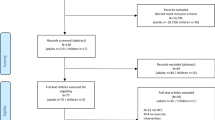Abstract
Purpose
Fatigue, decreased functionality, and impaired quality of life are some of the most common adverse outcomes of chemo-radiotherapy (CRT). Head and neck cancers (HNC) affect more than half a million individuals globally and its treatment takes a heavy toll on the patient, often affecting their speech, swallowing, and respiratory functions, and as a result they often develop fatigue, depression, and physical inactivity. The purpose of this study was to evaluate the effectiveness of exercise-based rehabilitation on functional capacity, quality of life, fatigue, hemoglobin, and platelet counts in patients with HNC on CRT.
Patients and methods
A randomized controlled trial was conducted on 148 patients with head and neck cancer undergoing CRT to evaluate the effectiveness of exercise on functional capacity measured by the 6-min walk test, quality of life measured by the Medical Outcomes Survey Short Form 36 v2 questionnaire, fatigue by the NCCN (0–10) scale, hemoglobin, and platelets. The control group received standard physical activity recommendations while the exercise group received a structured exercise program of aerobic and active resistance exercises for a period of 11 weeks.
Results
There was a significant improvement in the functional capacity (p < 0.001), quality of life (p < 0.001), and prevention of worsening of fatigue (p < 0.001) in the exercise group. The blood parameters did not show a significant difference between the control group and the exercise group.
Conclusion
Our results elucidate that an 11-week structured exercise program for HNC patients receiving CRT helps in improving their functional capacity and quality of life. It also prevents deterioration of fatigue levels in the exercise group.



Similar content being viewed by others
References
Kulkarni MR (2013) Head and neck cancer burden in India. Int J Head Neck Surg 4:29–35
John S, Hassuji M, Rajashekhar B (2011) Speech and swallowing outcomes in buccal mucosa carcinoma. Indian J Palliat Care 17(3):238–241
Gautam AP, Fernandes DJ, Vidyasagar MS, Maiya AG, Nigudgi S (2013) Effect of low-level laser therapy on patient reported measures of oral mucositis and quality of life in head and neck cancer patients receiving chemo-radiotherapy--a randomized controlled trial. Support Care Cancer 21(5):1421–1428. https://doi.org/10.1007/s00520-012-1684-4
Dimeo FC (2001) Effects of exercise on cancer-related fatigue. Cancer 92:1689–1693
Stasi R, Abriani L, Beccaglia P, Terzoli E, Amadori S (2003) Cancer-related fatigue: evolving concepts in evaluation and treatment. Cancer 98:1786–1801
Holmes MD, Chen WY, Feskanich D et al (2005) Physical activity and survival after breast cancer diagnosis. JAMA 293(20):2479–2486. https://doi.org/10.1001/jama293.20.2479
Van Blarigan EL, Meyerhardt JA (2015) Role of physical activity and diet after colorectal cancer diagnosis. J Clin Oncol 33(16):1825–1834. https://doi.org/10.1200/JCO.2014.59.7799
Tomlinson D, Diorio C, Beyene J, Sung L (2014) Effect of exercise on cancer-related fatigue: a meta-analysis. Am J Phys Med Rehabil 93(8):675–686. https://doi.org/10.1097/PHM.0000000000000083
Aghili M, Farhan F, Rade M (2007) A pilot study of the effects of programmed aerobic exercise on the severity of fatigue in cancer patients during external radiotherapy. Eur J Oncol Nurs 11:179–182
Rogers LQ, Anton PM, Fogleman A, Hopkins-Price P, Verhulst S, Rao K, Malone J, Robbs R, Courneya KS, Nanavati P, Mansfield S, Robbins KT (2013) Pilot, randomized trial of resistance exercise during radiation therapy for head and neck cancer. Head Neck 35(8):1178–1188. https://doi.org/10.1002/hed.23118
Samuel SR, Maiya GA, Babu AS et al (2013) Effect of exercise training on functional capacity & quality of life in head & neck cancer patients receiving chemoradiotherapy. Indian J Med Res 137:515–520
Pulte D, Brenner H (2010) Changes in survival in head and neck cancers in the late 20th and early 21st century: a period analysis. Oncologist 15(9):994–1001
Berger AM, Abernethy AP, Atkinson A, Barsevick AM, Breitbart WS, Cella D, Cimprich B, Cleeland C, Eisenberger MA, Escalante CP, Jacobsen PB, Kaldor P, Ligibel JA, Murphy BA, O’Connor T, Pirl WF, Rodler E, Rugo HS, Thomas J, Wagner LI (2010) Cancer-related fatigue. JNCCN J Natl Compr Cancer Netw 8(8):904–931. https://doi.org/10.6004/jnccn.2010.006712
Jones LW, Demark-Wahnefried W (2006) Diet, exercise, and complementary therapies after primary treatment for cancer. Lancet Oncol 7:1017–1026. https://doi.org/10.1016/S1470-2045(06)70976-7
Campbell MK, Piaggio G, Elbourne DR, Altman DG (2012)Consort 2010 statement: extension to cluster randomised trials. Bmj 345:5661–5661. https://doi.org/10.1136/bmj.e5661
Midgley AW, Lowe D, Levy AR, Mepani V, Rogers SN (2017) Exercise program design considerations for head and neck cancer survivors. Eur Arch Otorhinolaryngol 275(1):169–179 https://www.ncbi.nlm.nih.gov/pmc/articles/PMC5754417/
Cnossen IC, van Uden-Kraan CF, Rinkel RN ,et al.(2014). Multimodal guided self-help exercise program to prevent speech, swallowing, and shoulder problems among head and neck cancer patients: a feasibility study. Med Internet Res 6;16(3):e74. https://www.ncbi.nlm.nih.gov/pmc/articles/PMC3961811/
Zhao SG, Alexander NB, Jolly S et al (2015) Maintaining physical activity during head and neck cancer treatment: results of a pilot controlled trial. Head Neck 38:1086–1096 https://www.ncbi.nlm.nih.gov/pmc/articles/PMC5304917/
Acknowledgements
Dr. Samuel was supported by a junior research fellowship by Department of Science and Technology, Government of India (Ref No: IDP/MED/2011/20) for 2 years & a PhD Scholarship from Manipal Academy of Higher Education for 1 year.
NCI UG1CA189961, NCI R01CA181064 are the current grants supporting Drs. Mustian and Lin.
Author information
Authors and Affiliations
Corresponding author
Ethics declarations
The trial was initiated after approval from the Institutional Ethics Committee with registration number ECR/146/Inst/KA/2013 and written informed consent was acquired from each patient.
Conflict of interest
The authors declare that they have no conflict of interest.
Disclaimers
This research has been presented in part at the MAASC Annual meeting 2018 at Austria, Vienna. It has not been submitted for publication nor has it been published in whole or in part elsewhere.
Additional information
Publisher’s note
Springer Nature remains neutral with regard to jurisdictional claims in published maps and institutional affiliations.
Rights and permissions
About this article
Cite this article
Samuel, S.R., Maiya, A.G., Fernandes, D.J. et al. Effectiveness of exercise-based rehabilitation on functional capacity and quality of life in head and neck cancer patients receiving chemo-radiotherapy. Support Care Cancer 27, 3913–3920 (2019). https://doi.org/10.1007/s00520-019-04750-z
Received:
Accepted:
Published:
Issue Date:
DOI: https://doi.org/10.1007/s00520-019-04750-z




